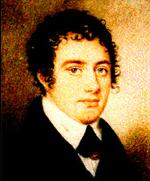Lord George Gordon Byron

Lord George Gordon Byron (1788-1824) was as famous in his lifetime for his personality cult as for his poetry. He created the concept of the 'Byronic hero' - a defiant, melancholy young man, brooding on some mysterious, unforgivable event in his past. Byron's influence on European poetry, music, novel, opera, and painting has been immense, although the poet was widely condemned on moral grounds by his contemporaries.
George Gordon, Lord Byron, was the son of Captain John Byron, and Catherine Gordon. He was born with a club-foot and became extreme sensitivity about his lameness. Byron spent his early childhood years in poor surroundings in Aberdeen, where he was educated until he was ten. After he inherited the title and property of his great-uncle in 1798, he went on to Dulwich, Harrow, and Cambridge, where he piled up debts and aroused alarm with bisexual love affairs. Staying at Newstead in 1802, he probably first met his half-sister, Augusta Leigh with whom he was later suspected of having an incestuous relationship.
| Books | Author |
|---|---|
| Childe Harold's Pilgrimage | Lord George Gordon Byron |
| Don Juan | Lord George Gordon Byron |
| Fugitive Pieces | Lord George Gordon Byron |
- Written After Swimming from Sestos to Abydos
- When We Two Parted
- To Thyrza: And Thou Art Dead
- To Thomas Moore
- The Giaour
- The Destruction of Sennacherib
- Stanzas Written on the Road Between Florence and Pisa
- Stanzas To the Po
- Stanzas To Augusta
- Stanzas For Music, There's Not a Joy the World Can Give
- Stanzas For Music
- Solitude
- So, We'll Go No More a Roving
- She Walks in Beauty
- On This Day I Complete My Thirty-Sixth Year
- On Chillon
- Oh! Snatched Away in Beauty's Bloom
- Lines, On Hearing That Lady Byron Was Ill
- Lines Written Beneath an Elm in the Churchyard of Harrow
- Lines Inscribed Upon a Cup Formed From a Skull
- Epistle to Augusta
- Darkness
- Churchill's Grave
- A Spirit Passed Before Me